Colin Morgan heads the cast in new four-part drama The Boy That Never Was. John Byrne met him on location to get the lowdown on the series adapted from Karen Perry's hit novel.
Sitting upstairs on a double-decker bus that's been transformed into a portable eatery and parked in the back garden of a pub in Greystones wasn’t - ever - on my bucket list. But here we are.
It’s a fresh November day in the beautifully-appointed Wicklow town that’s become something of a salubrious satellite, a well-heeled haven for Dubs who fancy the Hampstead-like tranquility available at the southern tip of the DART line.
Wandering through the spotless streets and admiring the quaint coffee shops and restaurants on the way from the train station, I make a mental note to return here in the summer for a day trip. It's September now and I haven't been back. As Shay Healy once wrote: What's Another Year?
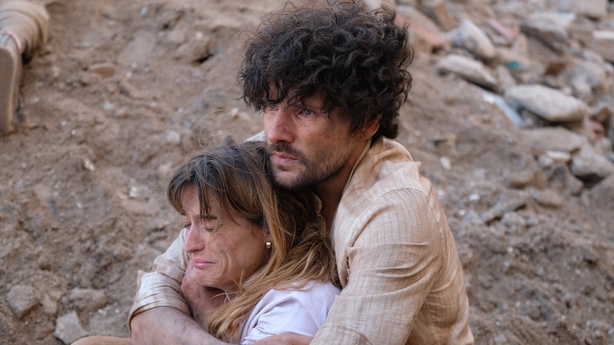
Going on location at a film or TV shoot is endlessly fascinating as you get to see how such things are made. I’m getting paid to watch other people put together a story, in the hope that enough people like it so they can go do it all again on another or related project. It doesn’t get more 'behind the scenes’ than this.
I’m on the bus, waiting for Colin Morgan (Belfast, Humans, Merlin) to take a break from filming on The Boy That Never Was, a brand-new psychological drama that lands on RTÉ One this Sunday.
The four-parter’s based on the best-selling debut novel of the same name by Irish author Karen Perry. The story begins with Harry (Morgan) and Robin (Toni O’Rourke) living the life of artists in Essaouira, Morocco, along with their toddler son, Dillon. Tragedy strikes when an earthquake hits and their apartment crumbles – with a sleeping Dillon inside.
Three years later, many miles away in Dublin, Harry spots a six-year-old boy in a crowd – a boy he's convinced is Dillon.
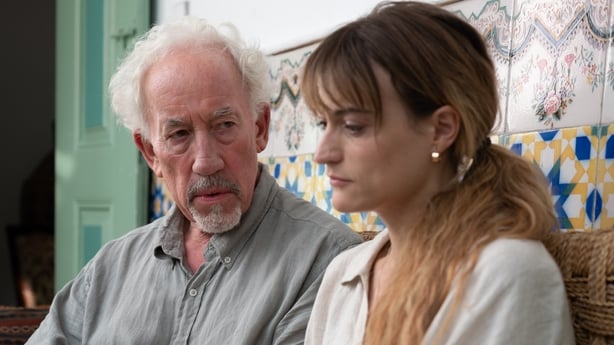
It’s a cracking premise and Colin Morgan has impressed, ever since I first saw him playing the title role in the superb BBC Saturday evening show, Merlin, a fantasy-adventure loosely based on the Arthurian legends and the relationship between young versions of Merlin and the future King Arthur.
Before taking a seat on the bus, I’d watched Colin in action, filming a scene in the boozer where the feeding bus is parked. For those of you familiar with Greystones, it’s The Beach House down at the harbour. I can only imagine how popular this place must be mid-summer. Well, when we actually experience a summer.
Today though, it’s packed with a filming crew who aren’t looking to chill or check out the chicken wings.
Everyone’s concentrating on getting the job done in daylight hours, pack up and then head home or wherever. A film/TV show set is like a human ant colony, especially on location. There’s a lot of people doing an enormous amount of milling around. Then someone calls for quiet on the set, everyone freezes, and the cameras start rolling.
Inevitably, something’s wrong and they stop and start again. And again. Then someone spots that the pint of stout that was fresh when it was first pulled now looks like it was left over from last night.
Everything has to look right. It’s as simple as that. Filming a pub scene might seem straightforward, but enormous patience and attention to detail are required to get it done.
Me? I’m wondering if the catering is up to scratch.
Grub consumed, Colin Morgan arrives with impressive timing and wanders upstairs. It’s not the first time I’ve interviewed someone on a catering bus, but it’s as weird as ever. Colin smiles a friendly smile as we share hellos and we’re on our way . . .
John Byrne: When you got the role, did you read the book? Or did you want to bring your own version of Harry and keep the two versions separate?
Colin Morgan: I often take the director's advice on that and ask what's best for the process and what's needed. And, as often is the case with adaptations, the on-screen version can be very, very different from the book. And from my understanding, this is so here.
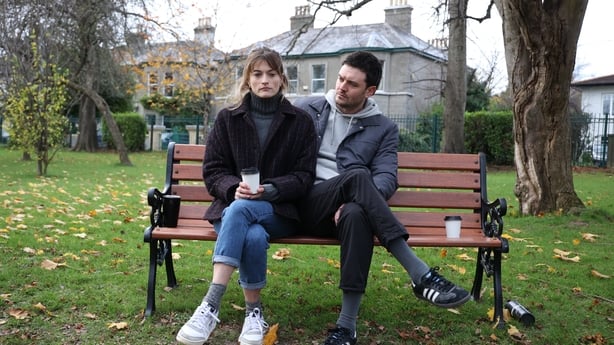
But it all comes from a great place. It all comes from a strong foundation. A lot of things that are adaptations, they’ve got a lot of depth to them. You can always tell, I think, when you read something, you're like, 'Was this in some book?' And usually, if you pick up that sense, it was.
Can you tell us where Harry and Robin are at the start? Can you tell us about that and and what happens?
The interesting thing about this show is that it spans quite a quite a time period from sort of 2017 till present day - it will be 2024.
When we meet them, they’re living a life in Morocco, having a great time and natural disaster circumstances changes all that and ruins what was supposed to be an ideal life and an ideal family.
So we do meet them in quite an idyllic place, and then very, very quickly meet them in a reality that’s not so good. And that's where the drama starts,
Morocco suffered an earthquake just before you were there. Did that change your approach and what does that do to your head? Does that make it all very real all of a sudden?
Absolutely, we were sort of prepping this project about a couple living in Morocco who are in the midst of an earthquake and lose their child and already occupy them, and trying to understand what that might feel like.
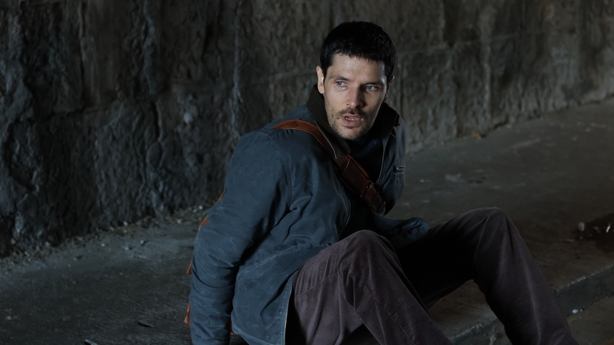
And then it happens in reality, on a scale that's beyond anyone's experiences and is truly tragic and terrifying, and you're questioning whether we're going to go ahead with something like this when it's so current.
I think it was the Moroccan people themselves, the Moroccan crew, who were absolutely adamant that, yes, we need to work with it. In fact, it becomes even more important to tell these kinds of stories.
On the ground, and certainly when we got there and heard a lot of the stories from people, it made this project much deeper than it was already going to be.
And do you prefer playing a kind of heroic figure as opposed to characters that have a bit more of a villainous side?
I like variety. I look for the things that are the hardest to do and the most intimidating things, things that I don't really know how to do.
Then when I'm there, and you know this energy being on set, where you know you actually have to find the answers - that's the best stuff.
The stuff before you turn up and maybe feel like you have done it before and you know how to do it, doesn’t quite give you the same buzz.
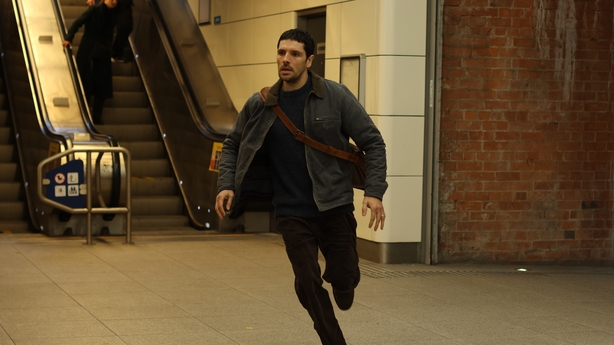
You don't make it easy for yourself, then?
Exactly, I think that's the key to life. Make it hard and make it challenging. And you get something out of it that you maybe don't expect.
What's been your favourite part about playing Harry?
Again, it literally is the difficulty, the challenge, the uneasiness of it and, yeah, it's all the challenges which actually don't feel good, you know, emotionally. But it's great to finish your day feeling exhausted and knowing that you've kind of rung the towel mostly dry.
Do you find it easy or difficult to leave these things behind? Because obviously it can be emotionally draining.
I think you do on any project. It's only when you finish that you hear a lot of people talking about getting sick and having a bit of a come down. It's only then that you realise you've actually - your body and your mind - has had a relationship with, as far as it's concerned, someone who now suddenly isn't there.
And actors tend to get this funny feeling. I suppose it is a sort of grief of some kind. It just recognises being with someone for a while and now that person is not there anymore.
You do - essentially - develop a kind of a relationship with the person. If you're wearing their clothes, literally their shoes, every day, yeah, you’re meeting them every morning for your breakfast.
On a different tangent, I wonder what it's like being an Irish actor at the moment in this kind of Green wave that's occurring, where Irish cinema, TV and actors are being given great credence. What has been your experience of seeing Irish names, locations and stories on the big and small screens?
It’s about time, I think a lot of stuff that has been filmed here over the years, just perhaps hasn't got quite the recognition it's deserved.
We've often been filmed here, but it’s been called somewhere else, you know. And I think now there seems to be a bit of an appetite for Irish stories and Irish voices.
Why do you think that's happened?
I don't know. I'd love to know the answer to that. It's great whenever something that's personal to you has a universal appeal - whenever people get enjoyment out of a part of your life and your culture and your people. It feels good, right?
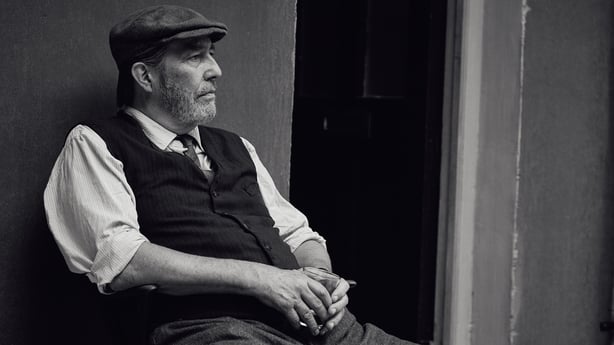
I think we all feel that. We like to see something become a hit worldwide, if it's from our wee place.
There's such great talent here, it's a beautiful place. Yeah, we've got our difficulties, but where doesn’t? And why not show all the light and the dark, and the laughter and the tears of this place.
And then when we had the recent success with Kenneth Branagh’s Belfast, which, again, you go, wow, here's Northern Ireland - which we're used to seeing on screen and have negative feelings towards - actually gives people that childhood feeling of nostalgia.
And that's not just people here. I mean, that's happened all over the world. That's pretty cool.
The Boy That Never Was, 9.30pm, Sunday, RTÉ One


